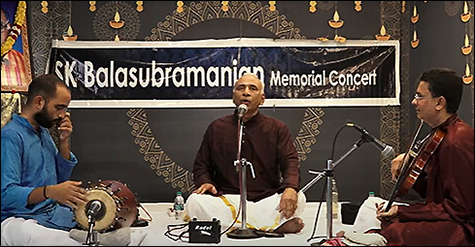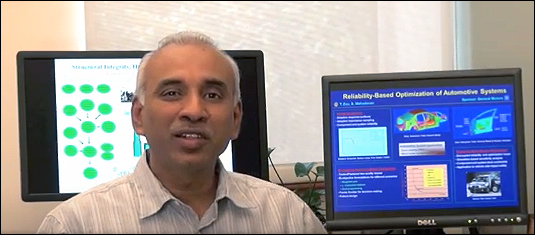The American Society of Civil Engineers has honored Vanderbilt engineering professor Sankaran Mahadevan with the 2023 George Winter Award for technical contributions as a structural engineer, creativity as a professional musician, composer and teacher, and exemplary research in the fields of risk and reliability and machine learning.
Mahadevan is the John R. Murray Sr. Professor of Engineering and an internationally recognized Carnatic classical music composer, vocalist and teacher. The Winter award is named for the late Cornell professor to honor the achievements of a structural engineer who exhibits equal passion for science and art. Mahadevan will receive the Winter medal at the 2023 Structures Congress in May.
“I find engineering and music to be complementary; engineering helps me bring analysis and research to music composition and performance, and music advances my clarity, concentration and effective communication in engineering research and teaching,” said Mahadevan, whose frequent travels involve keynote talks at conferences, collaborations with researchers, and vocal performances for the communities he visits.

Mahadevan is a professionally trained vocalist in Carnatic music, commonly associated with South India, and has performed for 30 years in concerts and music festivals in India and the United States. He lectures and offers workshops on Carnatic music, composes music and produces recordings. Mahadevan has taught Carnatic vocal music to about 200 students at the Kala Nivedanam School of South Indian Music and Dance in Nashville with his wife Monica Cooley, a well-known Indian classical dancer and teacher. He recently received the Acharya Ratna teaching award from the TVG Academy of Indian Music and Arts.
“Congratulations to Sankaran on this honor, which recognizes his outstanding talent as a researcher and a musician,” said Philippe M. Fauchet, Bruce and Bridgitt Evans Dean of Engineering. “He is an extraordinary ambassador for the spirit of discovery and creativity at Vanderbilt University.”
Mahadevan’s contributions in engineering research are in the fields of risk and reliability analysis, uncertainty quantification, systems health management, and decision-making under uncertainty. He is author of the definitive textbook in probabilistic methods in structural engineering.

During the past decade, he has been at the forefront of developing digital twin technology, where a computer model of a system is continuously updated with all available data, and demonstrating this technology for the risk management of aircraft, rotorcraft, marine vessels and civil structures, funded by the U.S. Air Force, U. S. Army, Mitsubishi, and ABS.
His work in uncertainty quantification in additive manufacturing and manufacturing process design and online control under uncertainty, is funded by the National Institute of Standards and Technology. He is concluding a large six-year NASA University Leadership Initiative project to develop machine learning techniques for safety assessment in air transportation operations. Another project is the development of sensing techniques for detecting and locating damage in concrete structures, funded by Idaho National Laboratory over the past six years. Currently, he is leading a DOE ARPA-E project on risk quantification and management in power grid operations in collaboration with Georgia Tech.
Professor Mahadevan had several other major achievements during the past year. His number of peer-reviewed journal articles crossed 350, with a Google scholar h-index above 80, and his 51st Ph.D. student graduated.
Mahadevan’s recent honors include a Distinguished Research Award from the International Association for Structural Safety and Reliability (IASSAR), which is given every four years to two or three prominent research leaders in the field. He is president of the Engineering Mechanics Institute in ASCE. He also served as co-chair of the annual conference of the Prognostics and Health Management Society for three consecutive years.
Contact: Brenda Ellis, 615 343-6314
brenda.ellis@vanderbilt.edu